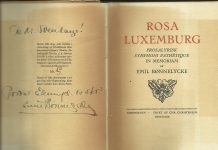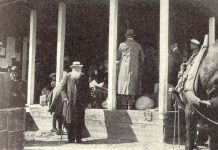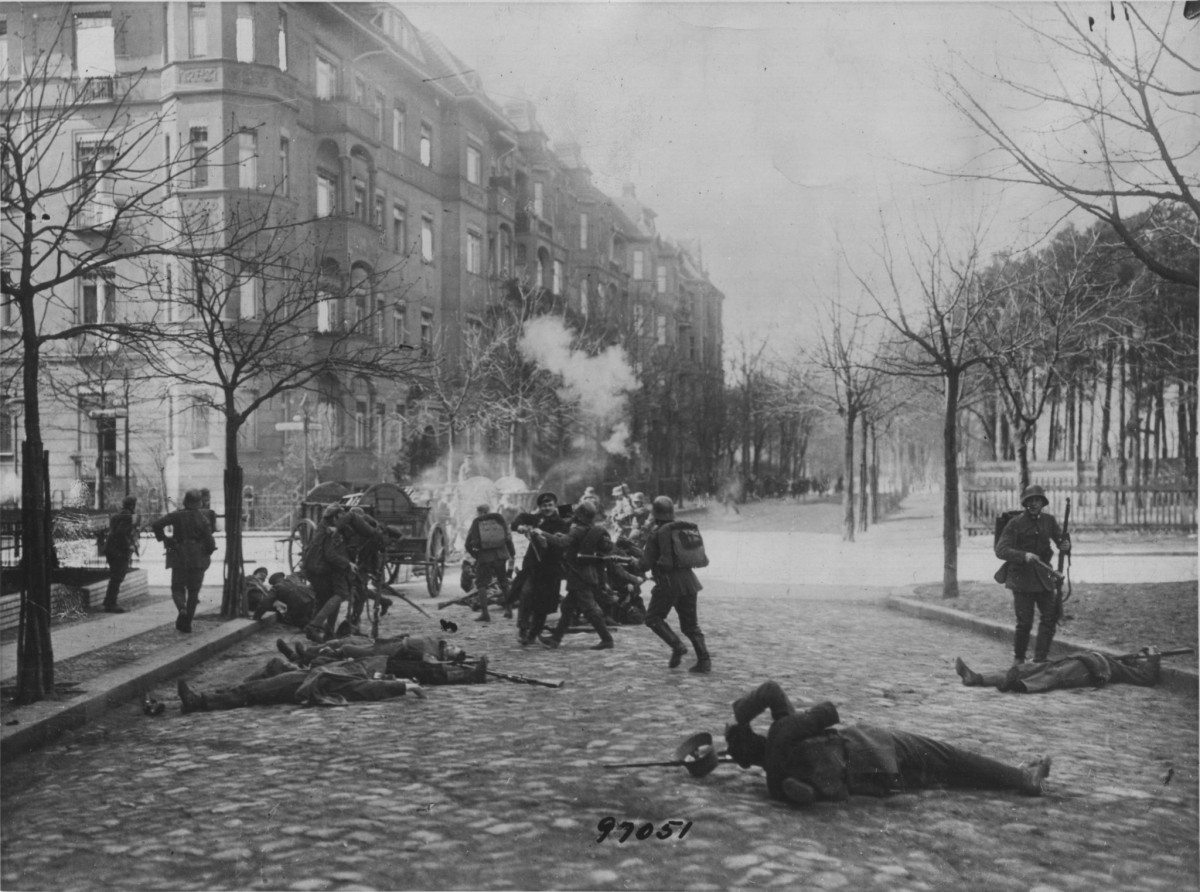
Emneliste om den tyske revolution: Arbejderopstanden, der brød ud efter 1. verdenskrig og endte med at blive nedkæmpet af Det tyske Socialdemokrati i alliance med reaktionære halvfascistiske militser. Det endte med likvideringer af flere hundrede arbejdere og flere af deres ledere bla. Rosa Luxemburg og Karl Liebknecht.
Indhold:
- 1918-1923
- 1918
- 1920
- 1921
- 1923
- Litteratur/Literature
- Se også/See also-links
- Se også /See also på Socialistisk Bibliotek
1918-1923
- Chronological time-line of the German Revolution (Marxists Internet Archive)
- History Archive of the German Revolution, 1918-1923 (Marxists Internet Archive). “A history archive dedicated to the documentation, analysis and interpretation of the events surrounding the German workers revolutions of 1918 through 1923.”
- Germany 1918 (Libcom.org). A collection of links to articles, biographies, maps, photo gallery, etc. from an anarchist/left wing communist point of view.
Revolutionen der kunne have ændret verdens gang (Socialistisk Revy, nr.13, marts/april 1999; online på Socialister.dk). “Tyskland 1918-23 var præget af revolutionære tilstande. Charlie Lywood skriver her, at var revolutionen lykkedes, ville verden have set meget anderledes ud i dag.”
Den tabte revolution: Tyskland 1918-23. Af Charlie Lywood (Internationale Socialisters Forlag, 1997, 58 sider; online på Marxisme.dk). “Revolutioner, der tabes, bliver hurtigt glemt. Men netop den revolutionære periode i Tyskland, som fulgte i kølvandet på første verdenskrig, er værd at huske.”
Days of hope – the 1918 German Revolution (Socialist Worker, Issue 2629, 4 November 2018). “A revolution in Germany that erupted 100 years ago this month rocked Europe’s rulers and put a socialist world on the agenda. Tomáš Tengely-Evans looks at how the revolt showed the power of workers to liberate themselves—and to end bloody war.”
Storming onto the stage of history—the forgotten women of the German Revolution (Socialist Worker, 9 November 2022). “Author Judy Cox uncovers how women played a central role in the German Revolution of 1918.”
Germany’s counterrevolution paved the way for the rise of Nazism. By Daniell Finn (Jacobin, February 6, 2022). An interview with Sean Larson: “A revolutionary upsurge after 1918 could have democratized German politics. Instead, the brutal repression used to contain that upsurge strengthened the authoritarian right, divided the German workers’ movement, and facilitated the rise of Hitler.”
The revolution that could have changed world history. By Axel Fair-Schulz (International Socialist Review, Issue 111, Winter 2018-19). Review of Chris Harman, The Lost Revolution: Germany 1918–1923 (Haymarket Books, 2017, 346 p.): “[The book] remains the single best introductory book in English on the German Revolution of 1918–1923. First published in 1982, it has lost nothing of its clarity, focus, and poignancy …”
The German Revolution of 1918 (Socialist Appeal, 9 November 2018). Extract from Rob Sewell, Germany 1918-1933: Socialism or Barbarism (Wellred Books, 2018, 488 p.). “In this book, Rob Sewell argues that the defeat of the German Revolution and the victory of Fascism were by no means inevitable. Had the German Revolution succeeded, the entire course of subsequent world history would have been different.”
Triumph, disarray, and defeat: German workers 1918–1933. By John Riddell (International Socialist Review, Issue 98, Fall 2015). Review of Ben Fowkes (ed.), The German Left and the Weimar Republic: A Selection of Documents (Haymarket Books, 2015, 400 p.). “Socialist historian Ben Fowkes has given us a unique and vivid text documentary of the German workers’ movement during the tumultuous years of its greatest influence, from November 1918 to its defeat by Nazism fifteen years later.”
Germany, 1918-1923: the fire and the spirit of revolution (Links: Journal of Socialist Renewal, March 3, 2015). With video talk (1:25:18 min.). “Communist historian Doug Enaa Greene lectures on the course of the revolution and the reasons why it didn’t succeed.”
The Comintern: History of the Marxist Internationals, Part 3. By Louis Proyect (The Unrepentant Marxist, February 28, 2010). “In this, the third installment of a series of articles on attempts to build workers or socialist internationals, I am going to discuss the Comintern but within a narrow historical and geographical framework, namely the German revolution of the early 1920s.”
Spartacism, Bolshevism and ultra-Leftism in face of the problems of the proletarian revolution in Germany (1918–1923). By Pierre Broué (Revolutionary History, Vol.9, No.4, 2008, p.108–118; online at Marxists Internet Archive). “… the very fact that the revolution – the world revolution – did not triumph in Germany itself, became a major fact of capital importance, at least in the history of Communism.”
When history failed to turn. By Neil Davidson (International Socialism, Issue 108, Autumn 2005). Review of Pierre Broué, The German Revolution, 1917-1923 (Brill, 2005, 991 p./Haymarket Books, 2006). “Broué does full justice to the importance of his subject. This is a work conceived on an epic scale, comprising 900 pages of carefully researched text, plus a chronological table and biographical notes.” See book extract (Marxists Internet Archive) + the whole book online at Libcom.org (pdf).
See more reviews:
Party and class in revolutionary crises. By Charlie Post (Against the Current, No.150, January-February 2011)
Review by Todd Chretien (International Socialist Review, Issue 50, November–December 2006) + Part 2 (Issue 52, March–April 2007)
Review by Mike Jones (Revolutionary History, Vol.9, No.3, 2006)
Theme: Germany 1918–23: From the November Revolution to the failed October (Revolutionary History, Vol.5, No.2, Spring 1994, p.1-144; online at Marxists Internet Archive). “Controversy continues to rage over the dramatic events surrounding the birth of the Weimar Republic. Was this series of events a failed revolutionary opportunity?”
Germany: From revolution to counter-revolution (Fortress Books, 1988, 93 p.; online at Marxist.com). “Rob Sewell gives a picture of the tumultous events – the 1918 revolution, the collapse of the Kaiser’s regime, the short- lived Bavarian Soviet Republic, the Kapp putsch in 1920, the French occupation of the Ruhr in 1923 and the ensuing revolutionary upheavals culminating in the abortive Hamburg uprising, finally Hitler’s rise to power in 1929-33.”
Why the German revolution failed. By Walter Held (Fourth International, Vol.3, No.12, December 1942 + Vol.4, No.1, January 1943; online at Marxists Internet Archive). “This article is published with the aim of stimulating discussion about the history of the early Communist International and the lessons it holds for revolutionaries today.”
… And Red Is The Colour Of Our Flag. By Oskar Hippe (Index Books, 1991; online at Marxists Internet Archive). Selected chapters from the book; Memoires: Revolution in Russia, Upheaval in Germany – After The November Uprising – Proletarian Battalions – 1923.
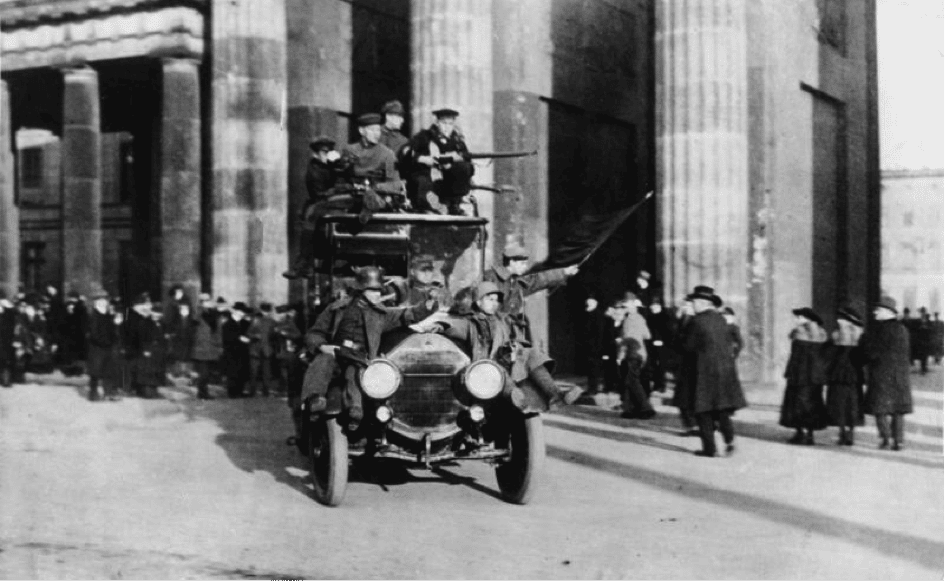
1918
- Tyske revolution (Leksikon.org)
- Novemberrevolution (Wikipedia.de). Tysk leksikal artikel.
- German Revolution of 1918–19 (Wikipedia.org)
- 9. november 1918 – Tyskland bliver en republik (Arbejderen, 9. november 2006)
Rosa Luxemburg og den tyske revolution. Af Marie Frederiksen (Revolution, 15. januar 2019). “Rosa Luxemburg og ledelsen i KPD fremførte behovet for at vinde masserne over til det revolutionære program, men de unge kommunister forstod ikke behovet.”
Kejserens fald og løftet om revolution. Af Axel Fair-Schulz (Socialistisk Information, 2. december 2018). “Den 9. november markerer 100-året for afsættelsen af Tyskland monark, Wilhelm II. Hans abdikation var kulminationen på en opstand nedefra mod krig og fattigdom, tilsvarende den russiske revolution året før …”
100 år siden Den Tyske Revolution. Af Victor Murray Vedsø
Fremad uden at glemme: Den tyske revolution 1918-19. Af Marie Frederiksen (Revolution, 27. januar 2009). “Den tyske revolution er en af de vigtigste begivenheder i verdenshistorien.”
Revolution i Tyskland. Af David Müller (Socialistisk Information, 13. november 2008). “Historien om en ung, kæmpende venstrefløjs dyrekøbte erfaringer med sekterisme og enhedsfront.”
Tyskland: fra revolution til kontrarevolution, del 1. Af Ditte Lysgaard (Revolution, 7. februar 2006) + del 2 (3. april 2006) + Opstanden i Berlin, del 3. Af Frederik Ohsten (12. juni 2006)
Den tabte revolution: Tyskland 1918-23. Af Kevin Ovenden (Socialistisk Arbejderavis, nr.156, 10. april 1997). “Den tyske revolution endte med nederlag. En sejr kunne have ændret det 20. århundredes forløb.”
Den tyske arbejderbevægelse og Novemberrevolutionen 1918. Af David Helin (Solidaritet, nr. 2, 1997) (Online på WayBackMachine). “I denne artikel vil jeg … beskrive udviklingen i den tyske arbejderbevægelse frem til 1. Verdenskrig, forholdene under krigen samt Novemberrevolutionen 1918.”
Røde Fane – Teaterprogram: “Orden hersker i Berlin”. Program for Fiolteatrets stykke: “Orden hersker i Berlin”, oktober 1970, 8 A4-sider. Med artikler af Claus Bryld, Hanne Reintoft, Clara Zetkin, Karl Radek, Karl Liebknecht og Rosa Luxemburg. (Online på Socialistisk Bibliotek).
Revolutionen i Tyskland – 1918/19 (Perbenny.dk)
In English:
When Germany’s Social Democrats made a revolution by half. By Sean Larson (Jacobin, January 18, 2021). Review of Robert Gerwarth, November 1918: The German Revolution (Oxford University Press, 2020, 329 p.) “However, as should be clear by now, Gerwarth’s account focuses almost exclusively on the actions of powerful men (and the very occasional woman) at the top of German politics and society.”
Chronicle of Germany 1918-19. By William Smaldone (Against the Current, Issue 200, May-June 2019). Review of William A. Pelz, A People’s History of the German Revolution (Pluto Press, 2018, 208 p.). “Drawing on the most up-to-date secondary literature in English and German as well as a wide range of primary sources that give voice to everyday people, Pelz provides a compelling, eminently readable narrative that will interest anyone who picks up the book.” See also review by Tom Whittaker (Counterfire, March 12, 2020).
Rosa Luxemburg, Karl Liebknecht and the 100 year revolution. By Evan Sedgwick-Jell (Counterfire, January 18, 2019). “One hundred years on from the murders of Rosa Luxemburg and Karl Liebknecht, their revolution still breathes.”
A woman’s place is in the Revolution. By Ingrid Sharp and Corinne Painter (Jacobin, January 15, 2019). “Rosa Luxemburg is rightly recognized for her enormous contributions to the international socialist movement. Yet the pivotal role that many other women played in the German Revolution is all too often ignored.”
When the sailors mutinied (Verso, Blog, 14 January 2019). Interview with Klaus Gietinger: “In January 1919, the German Social Democratic Party turned guns on its own supporters, brutally putting down the Spartacist uprising.”
The German Revolution of 1918 (In Defence of Marxism, 12 November 2018). Extract from Rob Sewell, Germany 1918-1933: Socialism or Barbarism (Wellred Books, 2018, 488 p.). “Why did the revolution occur and why did it fail? Rob Sewell provides an answer to these important questions as we mark the centenary of the 1918 German Revolution.”
Red flags over Germany. By Sean Larson (Jacobin, November 9, 2018). “One hundred years ago today, radical sailors, soldiers, and workers in Germany rose up to put an end to the carnage of World War I. And the revolutionary upheaval had only just begun.”
The fall of the Kaiser and the promise of revolution. By Axel Fair-Schulz (SocialistWorker.org, November 9, 2018). “November 9 marks the 100-year anniversary of the overthrow of Germany’s monarch, Wilhelm II. His abdication was the culmination of an uprising from below against war and poverty, similar to the Russian Revolution the year before — but this time in Europe’s biggest economic and military power.”
Revolution in Germany, 1918. By Paul Hampton (Solidarity & Workers’ Liberty, Issue 485, 7 November 2018). “What began as a sailors’ revolt within weeks saw workers’ councils take charge of various German cities. A social democratic government took power amidst a situation of dual power.”
Days of hope – the 1918 German Revolution (Socialist Worker, Issue 2629, 4 November 2018). “A revolution in Germany that erupted 100 years ago this month rocked Europe’s rulers and put a socialist world on the agenda. Tomáš Tengely-Evans looks at how the revolt showed the power of workers to liberate themselves—and to end bloody war.”
German revolution: diverted and betrayed by leaders of official social democracy (Weekly Worker, Issue 1225, 1 November 2018). “In this supplement, Ben Lewis shows how the heroic actions of November 1918 were doomed by misleaders.”
November 1918: Germany’s revolutionary month. By Sally Campbell (Socialist Review, Issue 440, November 2018). “In Berlin Karl Liebknecht and Wilhelm Pieck of the revolutionary socialist Spartacist Group met with the revolutionary shop stewards to decide the date for the insurrection in the capital …”
Remember, remember the 9th of November. By Donny Gluckstein (International Socialism, Issue 160, Autumn 2018, p.153-159). “… for Marxists, it is a pivotal point of the 20th century from which there is an enormous amount to learn. Of the many key lessons, three stand out: reform versus revolution; the fate of Soviet Russia; and the question of workers’ councils or parliamentary democracy.”
A revolution to remember. By Paul Mattick (Commune, Issue 1, Fall 2018). “One hundred years later, the forgotten German Revolution remains a powerful image of what might have been.”
Germany between war and revolution. By K. Javier Arauz (Commune, Issue 1, Fall 2018). “By the turn of the century, the German working class was assured of its role as the gravedigger of capitalism. Instead, it made revolution halfway, and dug its own grave.”
Luxemburg, Müller and the Berlin workers’ and soldiers’ councils. By John Rose (International Socialism, Issue 147, Summer 2015, p.113-138). Review of Ralf Hoffrogge, Working Class Politics in the German Revolution: Richard Müller, the Revolutionary Shop Stewards and the Origins of the Council Movement (Brill, 2014/Haymarket Books, 2015, 256 p.) + Ben Fowkes (ed.), The German Left and the Weimar Republic: A Selection of Documents (Brill, 2014/Haymarket Books, 2015, 399 p.). See also John Riddell’s review of Ben Fowkes: Triumph, disarray, defeat (Marxist Essays and Commentary, August 11, 2015) + William Smaldone’s review of Ralf Hoffrogge: The promise of a revolution (Against the Current, Issue 181, March-April 2016) + review by Dominic Alexander (Counterfire, April 27, 2017) + review by Christoph Jünke: Sisyphus (Historical Materialism, Blog, July 2020; online at Internet Archive).
Feedback:
Was the German Revolution defeated by January 1919? By Tony Phillips (Ibid., Issue 149, Winter 2016, p.185-195)
Some questions about the lost German Revolution. By Ian Birchall (Ibid., Issue 150, Spring 2016, page 185-190).
Revolutionary workers’ movements and parliaments in Germany 1918-23. By John Rose (Ibid., Issue 150, Spring 2016)
The Kapp Putsch and the German October: a reply to John Rose. By Tony Phillips (Ibid., Issue 152, Autumn 2016)
All power to the factory councils? By John Rose (Ibid., Issue 153, Winter 2017)
All Power to the Councils! By Sasha Simic (Socialist Review, Issue 372, September 2012). Review of Gabriel Kuhn (ed.), All Power to the Councils: A Documentary History of the German Revolution of 1918–1919 (PM Press, 2012, 352 p.). “This book presents a groundbreaking documentary history of the workers’ councils that emerged. Included are the most fascinating speeches, articles, programmes, letters and manifestos.” See also review by Jason Netek: The red dawn of a new day (International Socialist Review, Issue 86, November 2012) + the book online at Libcom.org (pdf).
The German Revolution, Part 1-4. By Volkhard Mosler (Socialist Worker, Issue 2128-2131, 18 November-9 December 2008). “Our series concludes as Volkhard Mosler describes the moves to crush the revolution in January 1919.” With links to the 3 other articles.
The German Revolution, November 1918. By Stan Crooke (Solidarity, 3/142, 20 November 2008) + How the reformists saved capitalism: The German revolution, 1918-19 (3/143, 4 December 2008)
Red November 1918 (Weekly Worker, Issue 747, November 27, 2008). “Ninety years ago, the destiny of the world revolution lay in the hands of the German working class. Ben Lewis describes the tumultuous events and draws some lessons for today.”
German Revolution ends horror of war. By Niklas Albin Svensson (In Defence of Marxism, 13 November 2008) + The German Revolution suffers its first defeat (22 December 2008)
Germany 1918-19: The revolution begins (Socialism Today, Issue 123, November 2008). “Robert Bechert looks at these incredible revolutionary events, assessing their relevance for socialists today.”
Rosa at a loss: the KPD leadership and the Berlin uprising of January 1919 – legend and reality. By Ottokar Luban (Revolutionary History, Vol.8, No.4, 2004, p.19-45; online at Workerscontrol.net). “As the study presented here shows in detail, the KPD Zentrale at first not only had no intention of leading an uprising against the Ebert–Scheidemann government, it did not even expect that such an uprising would take place.” Svensk udgave: Rådlösa Rosa (pdf) (Marxistarkiv.se, 20 s.).
The German Revolution. Chapter 7 in Paul Mattick: Marxism: Last refuge of the bourgeoisie? (Merlin Press, 1983; online at Marxists Internet Archive). “Contrary to Bolshevik expectations, the Russian Revolution remained a national revolution.”
The German Revolution. Chapter 10 in Victor Serge: Year One of the Russian Revolution (1972/1930; online at Marxists Internet Archive). “A Communist party that was too young, too inexperienced, without cadres, without a Central Committee capable of daring initiative. Masses of workers marching to do battle, but themselves too subservient to the traditions of Social-Democratic discipline to make up with their own action for the deficiencies of leadership and party.”
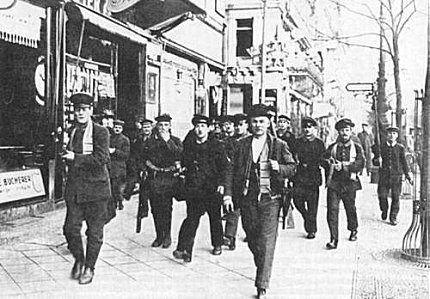
1920
Se Tidslinjen 13. marts 1920 om Kapp-kuppet.
1921
- March Action (Wkipedia.org)
Martsaktionen 1921. Kap. 6 i Charlie Lywood: Den tabte revolution: Tyskland 1918-23 (Internationale Socialisters Forlag, 1997, s.35-40).
Marsaktionen (1921) (pdf). Av Julius Braunthal (Marxistarkiv.se, 4. februar 2019, 4 s.). “Den föreliggande texten är översatt från den engelska upplagan av Julius Braunthal, History of the International 1914-1943, volymen 2 (Frederick A. Praeger, 1967).
Den tyska revolutionen – Märzaktion (pdf). Av Pierre Broué (Marxistarkiv.se, 12. november 2018, 49 s.). “De följande kapitlen ur Broués arbete om den tyska revolutionen 1917-1923 handlar om den s k Marsaktionen i Tyskland 1921 och dess för- och efterspel.”
Vad är brottet: Marsaktionen eller att kritisera den? (pdf) (Marxistarkiv.se, 27. november 2018, 26 s.). “Paul Levis försvarstal vid centralkommitténs möte 4 maj 1921. Levi hade kritiserats för sin offentliga kritik (i pamfletten ‘Vår väg’) av kommunistpartiets ultravänsteristiska Marsaktion.”
Den tyska revolutionen – Märzaktion (pdf). Av Pierre Broue (Marxistarkiv.se, 12. november 2018, 49 s.). “De följande kapitlen ur Broués arbete [franska utgåvan kom 1971; boken finns även på engelska: The German Revolution, 1917-1923 (2005)] om den tyska revolutionen 1917-19231 handlar om den s k Marsaktionen i Tyskland 1921 och dess för- och efterspel.”
Supplement: Before, during and after March (Weekly Worker, Issue 1346, 6 May 2021). “Ben Lewis explores the multiple causes behind what was a badly calculated bid to artificially induce revolution in Weimar Germany.” See also: Letting the facts speak for themselves (Ibid.).
Germany 1921: The tragedy of the ‘March Action’. By Rob Sewell (In Defence of Marxism, 30 March 2021). “100 years ago, the ultra-left leaders of the German Communist Party prematurely launched a revolutionary offensive. This proved to be a fiasco, wrecking the authority of the party. The 1921 ‘March Action’ contains important lessons for today.”
The March Action and the tragedy of German Communism (Jacobin, March 17, 2021). “A hundred years ago today, the German Communists tried to spark a revolution, but their would-be uprising ended in disaster. In this extract from a recently discovered memoir, Rosa Luxemburg’s biographer Paul Frölich describes the failure of the 1921 March Action and its impact.”
Germany 1921: The March Action. By Pierre Broué (Fourth International, Vol.1, No.2, 1964; online at Marxists Internet Archive). I svensk udgave på Marxistarkiv.se (pdf). “The debacle represented by the ‘March Action’ in Germany in 1921 was a crucial turning point in the development of the Communist International.”
Why the German Revolution failed. By Walter Held (What Next? No.1, 1996). “The article originally appeared in the December 1942 and January 1943 issues of Fourth International.”
Se også:
Navigating unchartered waters (Weekly Worker, Issue 1085, 3 December 2015). “Ian Birchall examines the deliberations of Comintern’s Third Congress in the aftermath of the 1921 March action.”
1923
Revolutionens højdepunkt – 1923, kap. 7 (side 41-48) + Den tyske oktober, kap. 8 (side 49-53). I Charlie Lywood: Den tabte revolution : Tyskland 1918-23 (Internationale Socialisters Forlag, 1997, 58 sider)
The German catastrophe of 1923 (In Defence of Marxism, Issue 43, August 2023; online 6 September 2024). “In this article, marking the hundredth anniversary of the dramatic failure of the German Revolution in October 1923, Tatjana Pinetzki explains how this situation emerged, the mistakes of the leadership, and the impact of these events on world history.”
Germany 1923: Crucible of world revolution. Part 1. By Sean Larson (Spectre, November 6, 2023). “In 1923, the hour of the global Communist movement had struck. From within the young Republic on the brink of total collapse, the most powerful workers’ movement in the world prepared for revolution.” See also Part 2 (November 11, 2023).
The German October: The missed revolution of 1923. By Peter Schwarz (World Socialist Web Site, October 27, 2023). “In October 1923, the German Communist Party prepared an insurrection and then cancelled it at the last minute, prompting Leon Trotsky to characterize it as ‘a classic demonstration of how it is possible to miss a perfectly exceptional revolutionary situation of world-historic importance’.”
The German army toppled a pioneering radical government and opened the way for Nazism. By Karl Heinrich Pohl (Jacobin, October 23, 2023). “In 1923, with Germany gripped by hyperinflation and far-right insurgents, Social Democrats and Communists formed a joint government in Saxony. It was a pioneering experiment in working-class democracy — before the military overthrew it.”
January 1923: Germany on the brink (In Defence of Marxism, 13 January 2023). “Today marks one hundred years since French troops invaded the Ruhr. This occupation, combined with hyperinflation, sparked revolutionary convulsions across Germany. With crisis once again haunting Europe, Rob Sewell examines the lessons of 1923.”
The ‘German October’ of 1923: A failed bid for workers’ power. By John Riddell (Marxist Essays and Commentary, December 1, 2021). “The text that follows will be included in a new collection, Lenin’s Comintern Revisited, scheduled for publication in 2022.”
The KPD and the crisis of world revolution. By Yusuf Timms (International Socialism, Issue 140, Autumn 2013; online only). “For a time, in the autumn of 1923, there seemed a real possibility that a new front was about to be opened up in the communist revolution that had begun in Russia six years earlier.”
The German Communist Party and the crisis of 1923. By Graham Milner (Links: International Journal of Socialist Renewal, 2010). “Two major consequences of the failure of the ‘German October’ were: first, it contributed towards the bureaucratic degeneration of the Soviet state; and second, it contributed towards the destruction of the KPD as a revolutionary party, thus removing it as a serious obstacle to the Nazi triumph in 1933.”
The German October: The missed revolution of 1923, Part 1-3. By Peter Schwarz (World Socialist Web Site, 29 October-1 November 2008). “The German defeat of 1923 had far-reaching implications. It allowed the German bourgeoisie to consolidate its rule and stabilise the situation for six years.”
The German October. Chapter 41 in: The German Revolution, 1917-1923 (pdf). By Pierré Broué (Brill, 2005, p.791-816.; online at Libcom.org). Scroll ned.
1923. Chapter 6 in Oskar Hippe: … And Red Is The Colour Of Our Flag (London, Index Books, 1991, p.63-76; online at Marxists Internet Archive). “Looking back on it, the year 1923 was a decisive one for the German working class. The question of power was posed to the proletariat more sharply than ever before.”
1923: the crucial year: The German October. Chapter 4 in Duncan Hallas: The Comintern (London, Bookmarks, 1985, p.89-103; online at Marxists Internet Archive). “It was not the decisive defeat in Germany itself, although it was the most serious setback since 1918.”
Det misslyckade upproret i Tyskland 1923 (pdf) (Cavefors, 1979; online på Marxistarkiv.se). “Följande är utdrag ur brittiske historikern E.H. Carrs bok Mellan Lenin och Stalin. Sovjet 1923-24 (Cavefors, 1979). Det kompletterar de samtida dokument som vi publicerat eller kommer att publicera om dessa händelser.”
1923: A missed opportunity? The German October legend and the real history of 1923. By August Thalheimer (1931) (Marken Press, 1993, 31 p.; online at Marxists Internet Archive). With introduction by Mike Jones (p.1-6). “This article by Thalheimer was first published by Marken Press in 1993. It is made available here in the strong belief that in any serious debate both sides in the Communist movement should be heard.”
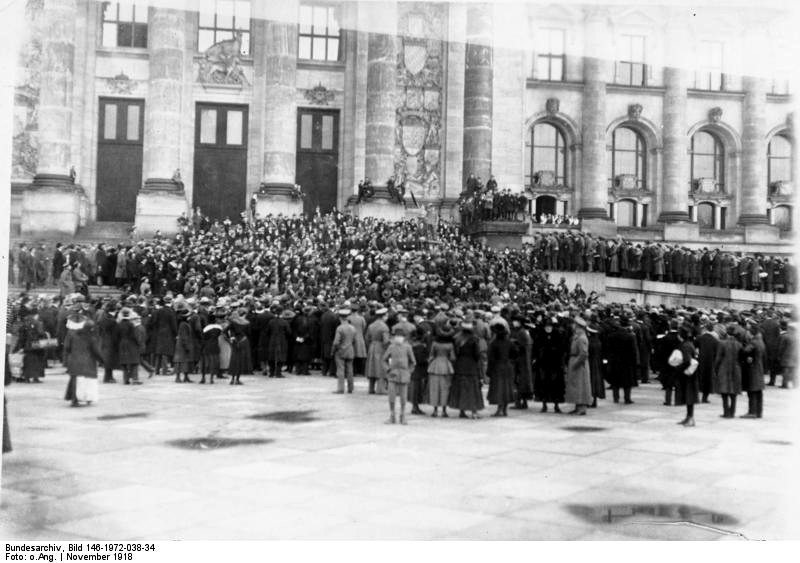
Litteratur
Novemberrevolutionen i Tyskland 1918. Temanummer af Politisk Revy (nr. 336, 28. juli 1978, 40 sider)
A People’s History of the German Revolution. By William A Pelz (Pluto Press, 2018, 208 p.)
The German Left and the Weimar Republic: A Selection of Documents. Edited by Ben Fowkes (Brill, 2014 / Haymarket Books, 2015, 400 p.).
All Power to the Councils!: A Documentary History of the German Revolution of 1918–1919. Edited and translated by Gabriel Kuhn (PM Press, 2012, 352 p.). See the book online at Libcom.org (pdf).
The German Revolution, 1917-1923. By Pierré Broué. Edited by Ian Birchall and Brian Pearce, translated by John Archer and with an introduction by Eric D. Weitz (Brill, 2005 / Haymarket Books, 2006, 991 p.). See extract (Marxists Internet Archive) + the whole book online at Libcom.org (pdf).
The German Revolution and the Debate on Soviet Power: Documents 1918-1919: Preparing the Founding Congress. Edited by John Riddell (Pathfinder Press, 1986, 540 p.).
The Lost Revolution: Germany 1918 to 1923. By Chris Harman (Bookmarks, 1982, 326 p.; new edition at Haymarket Books, 2017). See review by Axel Fair-Schulz : The revolution that could have changed world history (International Socialist Review, Issue 111, Winter 2018-19).
Se også / See also
The rise and fall of German communism. By Sean Larson (International Socialist Review, Issue 111, Winter 2018-19). Review of Ralf Hoffrogge and Norman LaPorte (eds.), Weimar Communism as a Mass Movement 1918–1933 (Lawrence & Wishart, 2017, 276 p). “The key theme running through most of the chapters in the collection is the politics, position, and influence of the KPD left.”
Revolutionary Germany: how did the right of the left react? (Weekly Worker, Issue 1226, 8 November 2018). “On November 9 1918, the kaiser abdicated and Germany became a republic. One hundred years later, we publish – thanks to Ben Lewis’s translation – abridged passages from the rightwing social democratic leader, Philipp Scheidemann.”
The KPD and the United Front during the Weimar Republic. By Marcel Bois (RS21: Revolutionary Socialism in the 21st Century, May 19, 2017). “It sets out the history of the United Front in Germany from the years 1920 to 1926. The United Front was a tactic developed by the Communist International in the early 1920s and this article charts its development, offering insight into some of the challenges the left face today in forging alliances over tactical issues.”
German workers and the birth of the united front. By John Riddell (International Socialist Review, Issue 79, September-October 2011). “Even in defeat, the German party’s experience in struggle for a united front is a fruitful legacy for working people today.”
A History of the German Republic [1918-1930]. By Arthur Rosenberg (Methuen & Co, 1936; online at Marxists Internet Archive). “In writing the present book I have striven to avoid one-sided judgements arising out of my own political activities in the years 1919-28.”
Se også / see also på Socialistisk Bibliotek
- Tidslinjen: 13. marts 1961, om Ruth Fischer
- Tidslinjen: 13. marts 1920 om Kapp-kuppet
- Tidslinjen: 2. maj 1919 om den bayerske rådsrepublik
- Tidslinjen: 7. august 1884 om Paul Frölich
- Tidslinjen: 17. juli 1867 om Leo Jogiches
- Tidslinjen: 11. marts 1883 om Paul Levi
- Tidslinjen: 13. august 1871 om Karl Liebknecht
- Personlisten: Rosa Luxemburg (1871-1919)
- Tidslinjen: 4. februar 1919, om Rosa Luxemburg – Prosalyrisk Symphoni pathetique in Memoriam, (oplæsningsdigt) af Emil Bønnelycke
- Linksamlingen: Liebknecht/Luxemburg-demoer i januar i Berlin
- Tidslinjen: 27. februar 1846 om Franz Mehring
- Tidslinjen: 31. oktober 1885 om Karl Radek
- Tidslinjen: 5. juli 1857 om Clara Zetkin
- Tidslinjen: 15. januar 1919 om mordene på Liebknecht & Luxemburg
- Tekster: Røde Fane (Teaterprogram for Fiolteatrets stykke: “Orden hersker i Berlin”, 1970)

















